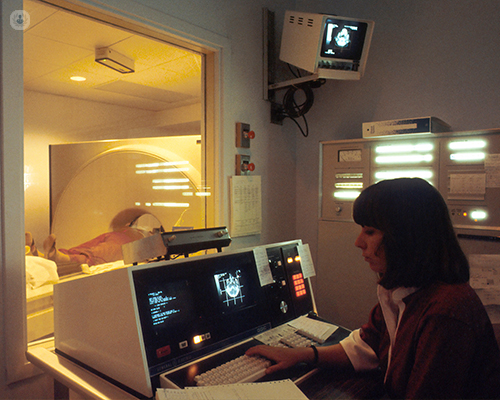A guide to MRI Fusion Vector prostate biopsy
Escrito por:What is an MRI Fusion Vector prostate biopsy?
An MRI Fusion Vector prostate biopsy is a procedure which can detect prostate cancer.
The procedure implements a combination of real-time ultrasound guidance and magnetic resonance imaging (MRI). It is a biopsy which can detect abnormal areas of the prostate which indicate that cancer may be present in the cells.

How is it performed and how long does it take?
During the procedure, the patient is appropriately positioned on an examination table, where the doctor will insert a thin needle through the rectum and into the prostate. The needle is guided by real-time ultrasound imaging, which is overlaid on the MRI images of the prostate. The needle will be used to pick up tissue samples from potentially affected areas.
The procedure is performed in a hospital and will last between 30 and 60 minutes.
Is it painful?
In general, an MRI Fusion Vector prostate biopsy is not painful. However, patients may feel slight discomfort during the process. It is possible for patients to take a local anaesthesia in order to reduce any discomfort felt throughout the procedure.
How does an MRI Fusion Vector prostate biopsy differ from a regular biopsy?
An MRI Fusion Vector prostate biopsy differs from a regular biopsy because it implements advanced imaging technology, unlike the aforementioned. It can identify the specific areas of the prostate where a biopsy is necessary.
The use of this technology permits more targeted biopsies, often reducing the number of samples taken, reducing the risk of complications and improving accuracy of results.
What are the benefits of an MRI Fusion Vector prostate biopsy?
An MRI Fusion Vector prostate biopsy has an increased rate of detecting clinically significant prostate cancer which, of course, is hugely beneficial. It also reduces the number of biopsies required and negative biopsies, as well as improved comfort for each patient.
Are there specific preparations for the biopsy?
Specific preparation differs for each individual, depending on their medical history and may also vary from hospital to hospital. Patients usually are required to avoid eating or drinking for a specific period of time prior to the procedure. It may also be necessary for the patient to stop taking specific medications and to for someone to come and collect them after the procedure.
What can patients expect after the procedure?
Following the procedure, the patient may experience some mild discomfort and increased urination. Additionally, they may find blood in their urine or semen for a few days after the procedure.
Doctors will provide aftercare instructions and the patient will be required to attend a follow-up appointment to review the biopsy results.
If you require a MRI Fusion Vector prostate biopsy and would like to book a consultation with Mr Kastner, you can do so through his Top Doctors profile today.


